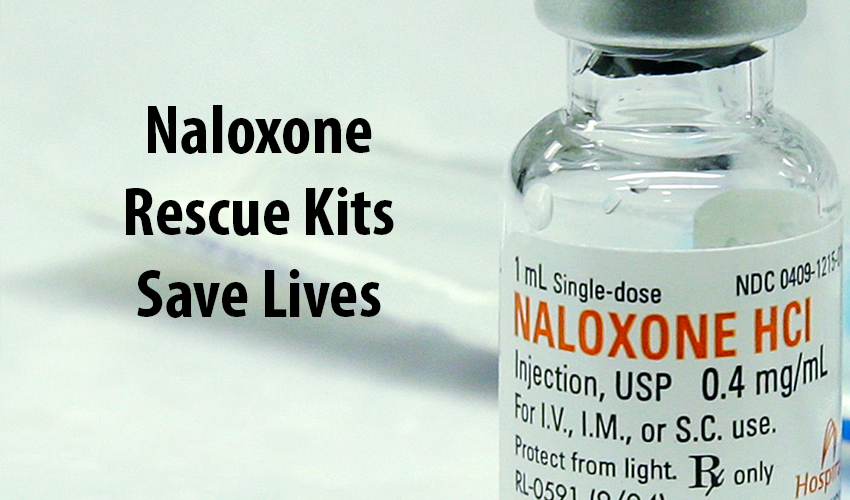Naloxone rescue kits are legal and save lives, says Opioid Task Force leaders
SALT LAKE CITY October 26, 2017 – Upon receiving reports that naloxone rescue kits were being confiscated, the Utah Opioid Task Force reiterated the legality of the life-saving kits and encouraged first responders, healthcare workers, and others to be ready to use them to save lives. Naloxone hydrochloride (Narcan®) can be a life-saving medication and is used solely as an antidote to reverse an opiate overdose. Utah law permits any individual within the state of Utah to obtain, carry, furnish, and administer naloxone to anyone at risk of overdosing themselves or to anyone at risk of witnessing an overdose around them.
“Utah laws permitting the use of naloxone were put in place to save lives, especially with the alarming number of Utahns dying of opioid overdoses. We are worried and concerned about recent reports that life-saving naloxone kits have been confiscated from those who can use them to save lives,” said Attorney General Sean Reyes. “Anyone in possession of a naloxone kit has the ability to keep a victim alive until they can receive emergency medical aid. The taking or confiscation of these rescue kits is rarely an appropriate action and could potentially result in a life lost.”
“The opioid crisis is devastating Utah and this country,” said Utah House Speaker Greg Hughes. “Naloxone rescue kits may be the difference between life and death for someone’s family member, friend or loved one. In 2014 and 2016, the Utah Legislature passed laws that permits the dispensing of naloxone. Naloxone kits may provide a second chance for individuals struggling with an opioid addiction, assists in the battle of this horrific pandemic and helps combat the devastation that follows. As we are fighting this opioid epidemic that is sweeping the nation, it is crucial this life-saving tool be readily available to those willing to carry and administer it.”
“The burgeoning heroin and opioid epidemic sweeping across the state is claiming the lives of over 24 Utahn’s per month – the devastation and loss of human life experienced by families within our local communities is utterly overwhelming,” said DEA District Agent in Charge Brian Besser. “The DEA Salt Lake City District Office and Metro Narcotics Task Force highly encourage the personal appropriation and immediate availability of naloxone kits for Utah’s first responders, educators, and any private individual willing to carry and administer this life-saving drug. The robust availability of individual Naloxone kits will greatly assist law enforcement officers and medical professionals in combatting this vicious plague and the carnage it leaves behind.”
“Naloxone rescue kits across the state of Utah, in the hands of nonmedical laypeople, have been responsible for over 1,800 lives saved,” said Dr. Jennifer Plumb, Medical Director of Utah Naloxone. “Carrying naloxone is an important and responsible strategy for anyone who knows individuals who may be at risk of an opiate overdose.”
While there are different forms of naloxone rescue kits available, the most widely available kit has an injectable form of naloxone. This administration method requires individual naloxone in vials as well as syringes for administration of the medication. The only way to administer this form of naloxone is by using syringes. It is essential that injectable naloxone be carried with syringes always. These syringes are essential for the delivery of this life-saving medication and should not be viewed as paraphernalia.
Naloxone may now be obtained without a prescription throughout the state of Utah, via a standing order issued and signed by the Director of the Utah State Department of Health. There is not a prescription required to possess it or furnish it to another individual. There are multiple agencies statewide who are actively supplying kits to community members to help them save lives around them. These include EMS agencies, medical providers, the substance abuse recovery community, agencies that work with those experiencing homelessness, and the state’s largest healthcare organizations.
The Utah Opioid Task Force was formed in early 2017 and is a voluntary task force made up of representatives from partner agencies and organizations across the state. The mission of the Task Force is to take action against opioid abuse through law enforcement, prosecution, proposed legislation, and innovation.
The Utah Opioid Task Force was organized by Attorney General Sean Reyes, Speaker of the House Greg Hughes, DEA District Agent in Charge Brian Besser, Dr. Jennifer Plumb, and includes representatives from the Utah State Senate, Utah House of Representatives, law enforcement, government agencies, and volunteer organizations.
# # #

